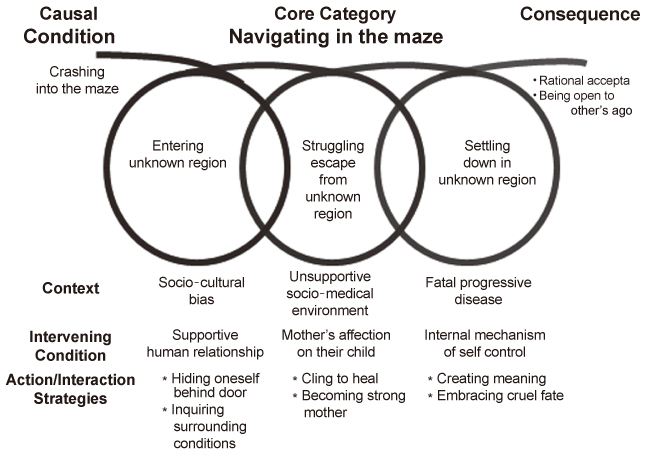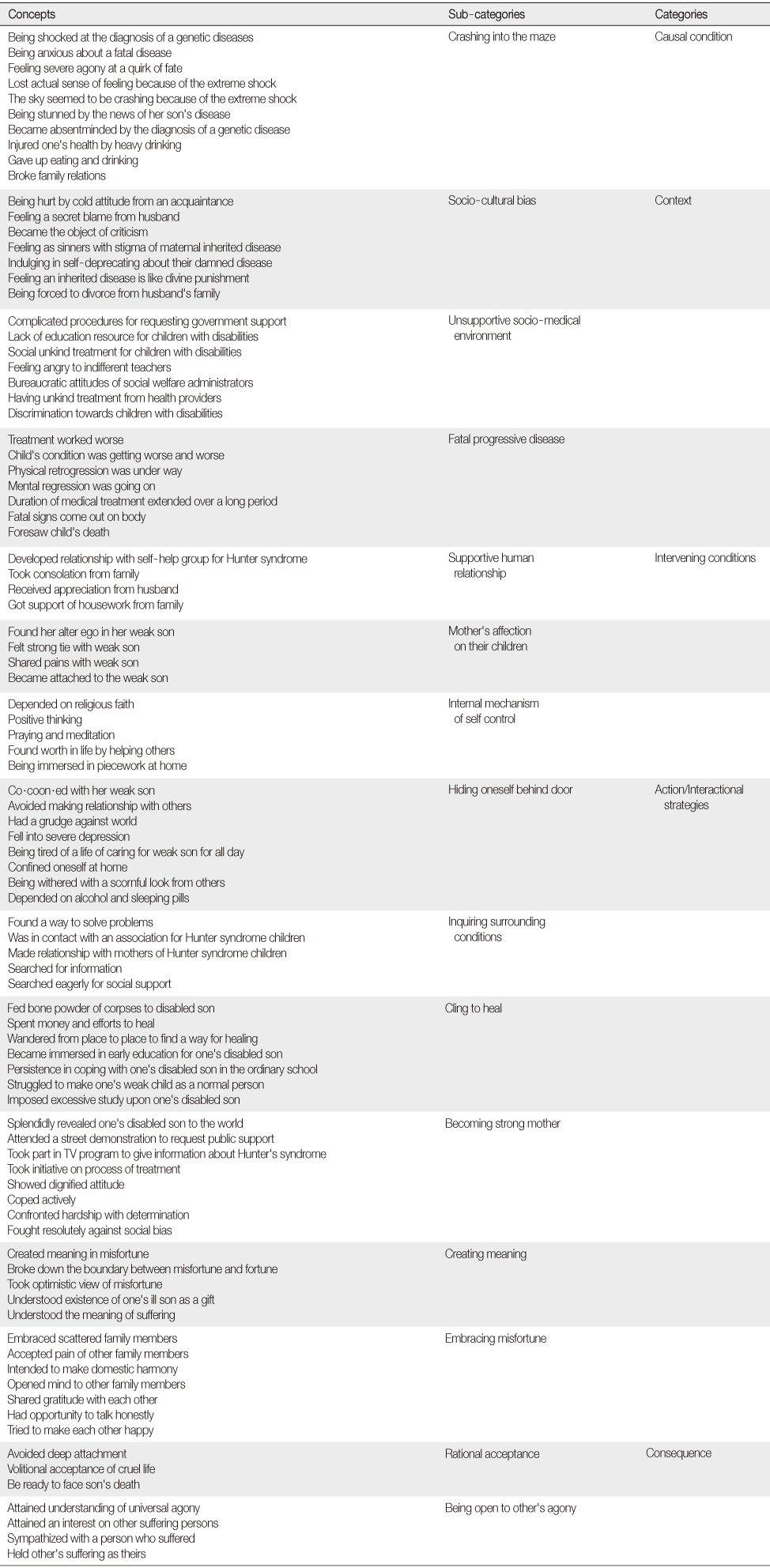Articles
- Page Path
- HOME > J Korean Acad Nurs > Volume 42(5); 2012 > Article
-
Original Article
- Life Experiences of Mothers in Parenting Children with Hunter's Syndrome
- Sung Ye Kang
-
Journal of Korean Academy of Nursing 2012;42(5):609-621.
DOI: https://doi.org/10.4040/jkan.2012.42.5.609
Published online: October 31, 2012
Department of Nursing, Kkotongnae University, Chungbuk, Korea.
- Address reprint requests to: Kang, Sung Ye. Department of Nursing, Kkotongnae University 133 Sangsam-gil, Hyundo-myeon, Cheongwon 363-823, Korea. Tel: +82-43-270-0174, Fax: +82-43-270-0120, srkang@kkot.ac.kr
• Received: February 9, 2012 • Accepted: September 17, 2012
© 2012 Korean Society of Nursing Science
- 956 Views
- 4 Download
- 5 Crossref
Abstract
-
Purpose
- The purpose of this study was to explore the experiences of Korean mothers in parenting children with Hunter's syndrome, an X linked recessive genetically inherited disease usually affecting boys.
-
Methods
- Data were collected from 14 mothers having children with Hunter's syndrome, through two focus group interviews and individual in-depth interviews. Qualitative data from the field notes and transcribed notes were analyzed using the grounded theory methodology developed by Strauss & Corbin (1998).
-
Results
- The core category about the process of rearing children with Hunter's syndrome was identified as "navigating in the maze". The process of rearing children with Hunter's syndrome passed through three phases; 'entering an unknown region', 'struggling to escape from the unknown region', 'settling down in the unknown region'.
-
Conclusion
- In this study "navigating in the maze", as the core category deeply showed joys and sorrows of mothers in the process of rearing their children with Hunter's syndrome. In this rearing process they gradually adjusted themselves to their given condition. Also they gained initiatively coping strategies to care for, and protect their children. Therefore health care providers can establish supportive programs in the clinical field to empower these mothers by reflecting their proactive coping strategies.
- 1. Fitzgerald R. Biological citizenship at the periphery: Parenting children with genetic disorders. New Genet Soc. 2008;27(3):251–266. http://dx.doi.org/10.1080/14636770802326927.Article
- 2. Goldman A. Home care of the dying child. J Palliat Care. 1996;12(3):16–19.ArticlePubMedPDF
- 3. Johansson A, Anderzen-Carlsson A, Ahlim A, Andershed B. Mothers' everyday experiences of having an adult child who suffersfrom long-term mental illness. Issues Ment Health Nurs. 2010;31(11):692–699. http://dx.doi.org/10.3109/01612840.2010.515768.ArticlePubMed
- 4. Lee CH. Green cross, Hunter syndrome medicine coming years 500 billion in annual sales goals. Korea Joongang Daily. 2012;01 11 E5.
- 5. Little C, Gould R, Hendriksz C. The management of children with Hunter syndrome-a case study. Br J Nurs. 2009;18(5):321–322.ArticlePubMed
- 6. Martin R, Beck M, Eng C, Giugliani R, Harmatz P, Muñoz V, et al. Recognition and diagnosis of mucopolysaccharidosis II (Hunter syndrome). Pediatrics. 2008;121(2):e377–e386.ArticlePubMedPDF
- 7. Metcalfe A, Coad J, Plumridge GM, Gill P, Farndon P. Family communication between children and their parents about inherited genetic conditions: A meta-synthesis of the research. Eur J Hum Genet. 2008;16:1193–1200. http://dx.doi.org/10.1038/ejhg.2008.84.ArticlePubMedPDF
- 8. Oh SE. The lived experience of mothers of children with muscular dystrophy. Korean J Child Health Nurs. 2001;7(4):421–433.
- 9. Oh SE. Caring experience of parents of children with muscular dystrophy. Korean J Fam Ther. 2005;13(2):171–194.
- 10. Park HS, Kim KB. Joys and sorrows in mothers of children with mucopolysaccharidosis. J Korean Acad Child Health Nurs. 2011;17(1):58–67. http://dx.doi.org/10.4094/jkachn.2011.17.1.58.Article
- 11. Rose N. The politics of life itself: Biomedicine, power and subjectivity in the twenty-first century. 2007;New Jersey, Princeton University Press.
- 12. Rozdzynska A, Tylki-Szymanska A, Jurecka A, Cieslik J. Growth pattern and growth prediction of body height in children with muccopolysaccharidosis type II. Acta Paediatr. 2011;100(3):456–460. http://dx.doi.org/10.1111/j.1651-2227.2010.02060.x.PubMed
- 13. Sandelowski M. The problem of rigor in qualitative research. ANS Adv Nurs Sci. 1986;8(3):27–37.ArticlePubMed
- 14. Steele RG. Experiences of families in which a child has a prolonged terminal illness: Modifying factors. Int J Palliat Nurs. 2002;8(9):418–434.ArticlePubMed
- 15. Strauss A, Corbin J. Basic of qualitative research: Techniques and procedures for developing grounded theory. 1998;CA, Thousand Oaks, Sage.
- 16. Yi M, Choe MA, Hah YS, Kim KS, Yih BS, Kim JH. Mother's experience of caregiving for their children with schizophrenia. J Korean Acad Nurs. 2006;36(1):45–54.ArticlePDF
REFERENCES
Figure & Data
REFERENCES
Citations
Citations to this article as recorded by 

- Optimizing Engagement: Factors Influencing Family Participation in a Positive Parenting Program among Vulnerable Households with Young Children
Hector Cebolla, Juan Carlos Martín, María José Rodrigo
Psychosocial Intervention.2025; 34(1): 53. CrossRef - The Experiences and Challenges of Mothers of Adult Patients with Mucopolysaccharidosis; Mothers of Adults with Severe Mucopolysaccharidosis
Yukiko SAKAGUCHI, Kyoko KUBO
Asian Journal of Human Services.2023; 25: 67. CrossRef - A systematic review and integrative sequential explanatory narrative synthesis: The psychosocial impact of parenting a child with a lysosomal storage disorder
Sadie Hassall, Debbie Michelle Smith, Stewart Rust, Anja Wittkowski
Journal of Inherited Metabolic Disease.2022; 45(3): 406. CrossRef - Experiences of Parenting Children With Spinal Muscular Atrophy
Hyo Jin Kim, Sun-Mi Chae
Journal of The Korean Society of Maternal and Child Health.2022; 26(3): 194. CrossRef - Hermeneutic Phenomenological Study on Caring Experience of the Mothers of Children with Epilepsy
Woo Joung Joung, Myungsun Yi
Journal of Korean Academy of Nursing.2017; 47(1): 71. CrossRef
Life Experiences of Mothers in Parenting Children with Hunter's Syndrome

Figure 1
Model of mothers' life experiences in parenting the children with Hunter's syndrome.
Figure 1
Life Experiences of Mothers in Parenting Children with Hunter's Syndrome
Concepts, Sub-categories, and Categories of Mothers' Life Experiences in Parenting the Children with Hunter's Syndrome
Table 1
Concepts, Sub-categories, and Categories of Mothers' Life Experiences in Parenting the Children with Hunter's Syndrome
 KSNS
KSNS
 E-SUBMISSION
E-SUBMISSION


 Cite
Cite

